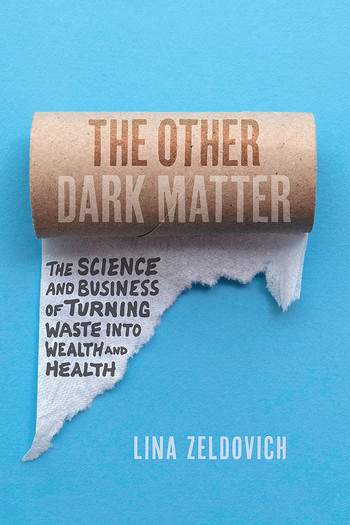If someone told you that the most optimistic book they’d read in a while was about human waste, you might think they were full of it. But to author Lina Zeldovich ’12JRN, “waste” is a misnomer. “That ugly, foul-smelling, disease-spreading substance is full of nutrients, particularly nitrogen, phosphorus, and potassium — the important building blocks for plants and all living things,” she writes. Yet by flushing this “treasure” away through miles of pipes, we’ve created huge problems: “The potent fertilizer we produce regularly … goes to fertilize all the wrong places: not the farm fields, but our rivers and lakes,” resulting in “depleted, barren soils in some places and overfertilized, stinky, dying creeks and marshes in others.”
Traveling as far as Chile, Madagascar, and Israel, Zeldovich goes in search of innovative ways to harness the power of poop. She meets scientists, inventors, and entrepreneurs and investigates an array of waterless toilets and biodigesters that convert feces into renewable energy (methane and carbon dioxide). Back in the US, she explores the life-saving potential of fecal transplants, told through the emotional story of a desperate and courageous Indiana couple.
Zeldovich, who grew up on a farm in Russia, laments the social and economic forces that have demonized dung and destroyed what was once a wholesome and natural recycling process. She recalls how her grandfather would empty the family septic tank with buckets and spread the “riches” over his strawberry patches — which resulted, over time, in black, fertile soil that yielded delicious fruit. It’s from this vantage that she traces the history of waste management, from the dung pits of early settlements to the communal latrines of the Romans (men used their togas to shroud themselves) to the eighteenth-century Japanese “night soil” merchants who collected household sludge to sell to farmers.
But two later developments — the discovery of microbes and the advent of synthetic fertilizer — changed everything, Zeldovich writes. “We destroyed the organic goodness we produced, and we forged synthetic fertilizers to grow our crops … At the same time, the developing countries kept struggling with disease outbreaks and other sanitation issues stemming from fecal contamination of drinking water. It seemed that neither world could get its shit right.”
For those who like thematic unity between their lives and books — reading Death in Venice while in Venice, for instance — The Other Dark Matter should make perfect bathroom reading. (Certainly it should not be consumed over lunch.) And while some of the technical passages about the biological processes of bacteria and the engineering complexities of tomorrow’s toilets can be hard to digest, Zeldovich softens things with humor and humanity. In writing a primer on poop and its possibilities, the author performs a much larger function: destigmatizing a vital biological product that has long gotten a bum rap.



